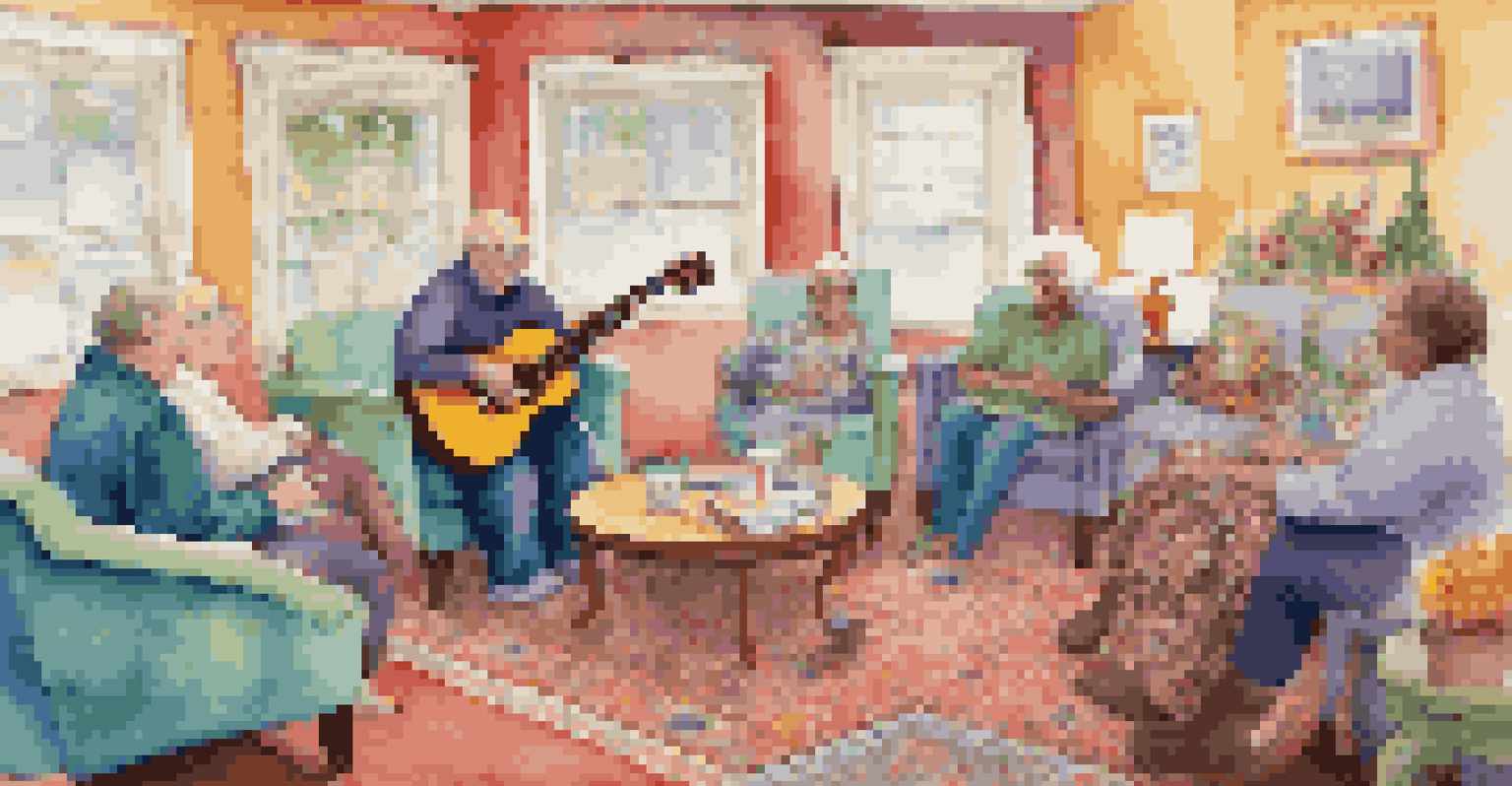The Therapeutic Role of Music in Hospice Care

Understanding the Role of Music in Hospice Care
Music has long been recognized as a powerful tool for healing, especially in hospice care. It serves as a bridge between patients and their emotions, allowing them to express feelings that might be difficult to articulate otherwise. In this environment, music can create a sense of peace and comfort, essential for both patients and their families during challenging times.
Music can change the world because it can change people.
For many, the end-of-life journey can be daunting and filled with anxiety. Music therapy can help to alleviate some of these feelings, providing a calming presence that fosters relaxation. This therapeutic approach can lead to improved emotional well-being, making the hospice experience more bearable for everyone involved.
Moreover, music's universal language can resonate across different cultures and backgrounds, making it an inclusive option for care. Whether it’s a favorite song or soothing melodies, the right music can create a familiar and safe atmosphere for patients, enhancing their overall experience in hospice care.
The Benefits of Music Therapy in End-of-Life Care
Music therapy offers numerous benefits in the context of end-of-life care, particularly in managing pain and discomfort. Research shows that listening to music can help reduce the perception of pain, leading to a more peaceful transition. This is especially important in hospice settings, where prioritizing comfort is crucial.

Additionally, music therapy can facilitate better communication between patients and caregivers. When words fail, music can express emotions and experiences, creating a deeper connection. This can be particularly impactful for patients who are unable to communicate verbally due to their condition.
Music Alleviates End-of-Life Anxiety
Music therapy provides a calming presence for patients, helping to reduce feelings of fear and anxiety during their final journey.
Furthermore, music can evoke cherished memories, providing a sense of nostalgia and joy. For families, sharing these musical moments can strengthen bonds and create lasting memories, making the journey through hospice care a little more meaningful.
How Music Can Improve Emotional Well-Being
Emotional well-being is a significant aspect of hospice care, and music plays a vital role in enhancing it. It can lift spirits, alleviate feelings of sadness, and promote a sense of peace. The emotional responses elicited by music can be incredibly therapeutic, allowing patients to process their experiences in a supportive environment.
Where words fail, music speaks.
For instance, a patient might find solace in a familiar tune that brings back fond memories. This connection can provide comfort during a time that often feels overwhelming. Music can also serve as a distraction from pain or anxiety, providing a mental escape.
Moreover, engaging with music—whether through listening, singing, or even playing instruments—can foster a sense of agency and involvement. This active participation in music can empower patients, helping them feel more in control of their emotional state, which is particularly important in an unpredictable time.
Creating a Personalized Music Experience
One of the most effective strategies in using music for hospice care is to create a personalized music experience for each patient. Understanding individual preferences can significantly enhance the therapeutic effects of music. Caregivers can work closely with patients and families to curate playlists that reflect their tastes and backgrounds.
Involving family members in this process can also strengthen emotional connections. They might share stories about why certain songs are meaningful, adding depth to the experience. This collaborative approach not only honors the patient's life but also reinforces bonds during a critical time.
Personalized Music Enhances Care
Creating a tailored music experience for each patient promotes emotional well-being and strengthens connections with family.
Moreover, personalizing music experiences can lead to more positive outcomes. When patients hear songs that resonate with their life story, it can evoke joy, comfort, and even stimulate conversation, making a profound impact on their emotional state.
The Role of Music in Family Support
Hospice care is not just about the patient; it also involves families who are navigating their own emotional challenges. Music can serve as a powerful tool for family support, helping them process grief and anxiety. Shared musical experiences can create a sense of unity, offering families a way to bond and cherish moments together.
For many families, music can become a source of comfort during difficult conversations about death. It can provide a gentle backdrop that eases tension, making it easier for loved ones to express their feelings. This shared emotional experience can foster deeper connections, providing solace in the face of impending loss.
Furthermore, music can facilitate remembrance and celebration of life. Families can gather to listen to meaningful songs, honoring the patient’s journey and legacy. This practice can help in the grieving process, allowing families to find peace amidst sorrow.
Implementing Music Therapy in Hospice Settings
Implementing music therapy in hospice settings requires a thoughtful approach, ensuring that the needs of patients and families are met. It often starts with a qualified music therapist who can assess the individual needs and create tailored interventions. This professional can guide caregivers in using music effectively, ensuring it aligns with the overall care plan.
Training staff on the basics of music therapy can also enhance the overall experience. Simple strategies, such as incorporating music into daily routines or during specific care tasks, can make a significant difference. This creates a more holistic approach to care, where music becomes an integral part of the healing process.
Music Supports Family Emotional Health
Shared musical experiences can help families process grief and foster deeper connections during challenging times.
Moreover, collaboration with families is crucial. Encouraging family members to engage with music can enhance its impact, making them feel more involved in the care process. Together, they can create an environment where music serves as a source of comfort and connection.
The Future of Music in Hospice Care
As we look to the future, the role of music in hospice care is likely to expand even further. Research continues to uncover the profound effects of music therapy, leading to more widespread acceptance and integration into care practices. This growing recognition is paving the way for more resources and training dedicated to music therapy in hospice settings.
Additionally, advancements in technology are making it easier to incorporate music into care. With the rise of streaming services and digital playlists, caregivers can quickly access a wide variety of music tailored to individual patient preferences. This accessibility opens up new avenues for enhancing the hospice experience through music.

Ultimately, as we embrace the therapeutic power of music, we can create more compassionate and supportive environments for patients and families during their most challenging times. Music will continue to play a vital role in hospice care, enhancing emotional well-being and creating lasting memories.